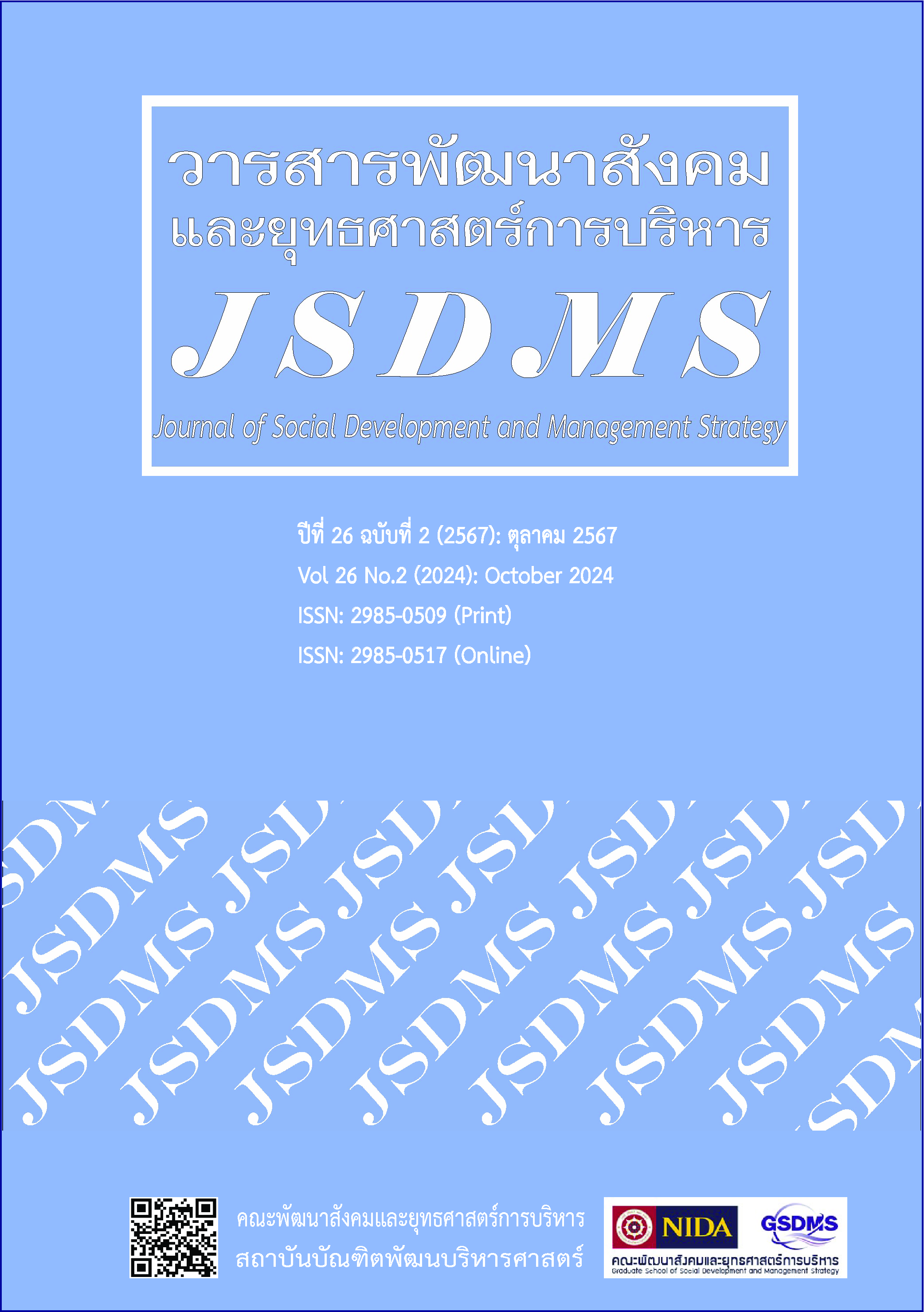The Critical Discourse Analysis of the Political Movement of the Student and the People (2020)
Main Article Content
Abstract
This research aims to examine the relationship between linguistic dimensions and social dimensions in order to explore political discourse in counter hegemony from the political movement phenomena of the student and the people in 2020. This study used the qualitative research methodology through the framework of Norman Fairclough’s Critical Discourse Analysis (CDA) which encompasses 3 dimensions: 1) text, 2) discursive practice, and 3) socio-cultural practice. The data for the analysis is the texts of 10 protesters' leaders, collected from speeches, interviews with the media, television appearances, participation in academic seminars, and participation in clarifications at meetings of the House of Representatives. Additionally, the secondary data include the texts from groups holding state power and groups opposing protest movements, derived from interviews with the media and various official statements, for analysis.
The results of the study found that following the 2014 coup, reconfiguration of power occurred, impacting political, economic, and social dimensions, particularly exacerbating economic inequalities and social injustices, which led to the emergence of the 2020 political movement. Furthermore, ten alternatives discourses were discovered, existing as embodiments of thought through language and used as crucial tools in the struggle. These discourses reveal embedded political ideologies within the texts from both the protesters, namely ‘liberal democracy’, and the groups holding state power and those opposing protest movements, namely, ‘monarchist conservatism’ and ‘authoritarian conservatism’.
Article Details

This work is licensed under a Creative Commons Attribution-NonCommercial-NoDerivatives 4.0 International License.
References
Adamson, W. L. (1980). Hegemony and Revolution A Study of antonio gramsci's political and cultural theory. California: University of California Press.
BBC NEWS Thai. (2020a). Future forward: The constitutional court orders the dissolution of the future forward party and bans its executive committee members from politics for 10 years [In Thai]. Retrieved from https://www.bbc.com/thai/thailand-51582581
BBC NEWS Thai. (2020b). Khana Ratsadon: Announcing three demands before the major rally on October 14: Prayut resigns-open parliament amend the constitution-reform the monarchy [In Thai]. Retrieved from https://www.bbc.com/thai/thailand-54461248
BBC NEWS Thai. (2021). From coup leders to the 7-year civilian prime minister, Gen. Prayut Chanocha, and the dynamics of power seizure, relaxation, and consolidation[In Thai]. Retrieved from https://www.bbc.com/thai/thailand-57196551
Chairat Charoensin-O-Larn. (2013). Language and politics/the political [In Thai] (2nd ed.). Bangkok: Faculty of Political Science, Thammasat University Textbook.
Chairat Charoensin-O-Larn. (2018). Power unbound: Language, discourse, everyday life and the Changing World [In Thai]. Bangkok: Faculty of Political Science, Thammasat University Textbook.
Chayut Pansuwan & Somsak Samukkethum. (2019). Analyzing Thai student movements in the period of political turmoil 2006-2014 [In Thai]. Journal of Social Development, 21(2), 216-234.
Fairclough, N. (1989). Language and power. London: Longman.
iLaw. (2019). Speeches from the parliament: The NCPO inherits power, not as discourse but as a formality. Retrieved from https://ilaw.or.th/node/5287 (In Thai)
Jantima Angkapanichkit. (2019). Discourse analysis [In Thai] (2nd ed.). Pathum Thani: Thammasat University.
Matichon News Agency. (2021). Thailand records 2020. Bangkok: Matichon. (In Thai)
Matichon TV. (2020, October 31). Listen, Penguin proclaimed boldly, ‘A cage may confine a star, but it can never confine its light’ [Video file]. Retrieved from https://www.youtube.com/watch?v=OyJNgDdRmag
Natthaporn Panpothong. (2013). Critical discourse analysis in linguistics: Concepts and studies of discourse in the Thai language [In Thai] (2nd ed.). Bangkok: Chulalongkorn University.
Office of the National Economic and Social Development Council reveals that Thailand’s wealth inequality has surged over the past decade, with the richest becoming 20 times wealthier than the poorest. Household debt relative to GDP has surpassed 80 percent [In Thai]. (2020, September 22). Matichon Online. Retrieved from https://www.matichon.co.th/economy/news_2359806
Pacharawat Senthong. (2019). The political ideology: Thai political ideology [In Thai]. Journal of Graduate Studies Valaya Alongkorn Rajabhat University, 13(3), 230-248.
Phichai Ratnatilaka Na Bhuket. (2020, February 28). The movement of students [In Thai]. MGR Online. Retrieved from https://mgronline.com/daily/detail/9630000020003?fbclid=IwAR1Tli-
Pichamon Sriraksasin & Pailin Phujeenapan. (2020). The section 44 as the hegemonizing apparatus of the national council for peace and order (NCPO) government [In Thai]. Political Science and Public Administration Journal, 11(1), 171-188.
Preeyanoot Preechamart. (2020). I am not afraid of ‘them’ because all humans are equal: Phai Daodin shares his life story of continuing to fight against injustice after being released from prison [In Thai]. Retrieved from https://nisitjournal.press/2020/11/09/pai-jatupat-interview/
Rungnapa Phimmasri. (2020, November 12). Mind Passarawalee: If the government asks when will it stop, Prayut will resign, let’s talk then [In Thai]. Prachachat Online. Retrieved from https://www.prachachat.net/d-life/news-552809
Sanchaiy Srisunt. (2018). On critical discourse analysis. Bangkok: Sommodhi. (In Thai)
Stand up for democracy! students across Thailand launch 28 hashtags to express their identity and oppose dictatorship [In Thai]. (2020, February 25). Prachachat Online. Retrieved from https://www.prachachat.net/social-media-viral/news-424798
Thanawat Matthaweewong. (2016). The critical discourse analysis of “returning happiness to the people” TV program. (Unpublished master’s thesis) [In Thai]. Thammasat University, Bangkok.


